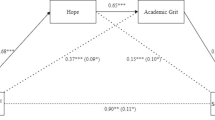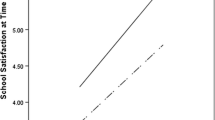Abstract
Background
Poverty’s impact on children’s academic outcome is a cause for concern in most urban Asian cities as education is viewed as one of the main channels of social mobility. Few studies examined how poor children’s hope could be enhanced through school social support.
Objective
This paper examines how children from low-income families’ perceived frequencies and importance of social support from teachers and classmates, influence their levels of hope in academic achievement.
Method
Utilizing a partially-mixed sequential design—first, with survey data from a larger study on low-income children (n = 513), this paper explores if perceived frequency of social support is associated with level of hope as well as the role of perceived importance in moderating the frequencies of school social support on sense of hope; second, to enrich the child-reported results, two in-depth focus group discussions with elementary school teachers (n = 10) were conducted.
Results
Statistical analysis reveals that the frequency of social support from teachers and classmates is associated with the level of hope in low-income children. Furthermore, when teacher’s support was rated important by children, there was a positive association between social support and hope. Integrating statistical results and qualitative insights, this paper extends extant literature on social support typologies with a novel category; ‘support in providing opportunities for success’.
Conclusion
This paper underscores the important role schools play as a source of social support for children. Such social support aids higher hope levels in low-income children which could translate into better academic outcomes.



Similar content being viewed by others
References
Appadurai, A. (2004). The capacity to aspire: Culture and the terms of recognition. Culture and Public Action, 59, 62–63.
Areepattamannil, S. (2010). Parenting practices, parenting style, and children’s school achievement. Psychological Studies, 55(4), 283–289. https://doi.org/10.1007/s12646-010-0043-0
Bokhorst, C. L., Sumter, S. R., & Westenberg, P. M. (2010). Social support from parents, friends, classmates, and teachers in children and adolescents aged 9 to 18 years: Who is perceived as most supportive? Social Development, 19(2), 417–426. https://doi.org/10.1111/j.1467-9507.2009.00540.x
Bruner, C. (2017). ACE, place, race, and poverty: Building hope for children. Academic Pediatrics, 17(7S), S123–S129. https://doi.org/10.1016/j.acap.2017.05.009
Cheavens, J., Taylor, J. D., Kahle, K., & Snyder, C. R. (2000). Interactions of high- and low-hope individuals. Unpublished manuscript, Department of Psychology, University of Kansas, Lawrence.
Claro, S., Paunesku, D., & Dweck, C. S. (2016). Growth mindset tempers the effects of poverty on academic achievement. Proceedings of the National Academy of Sciences of the United States of America, 113(31), 8664–8668. https://doi.org/10.1073/pnas.1608207113
Demaray, M. K., & Elliott, S. N. (2001). Perceived social support by children with characteristics of attention-deficit/hyperactivity disorder. School Psychology Quarterly, 16(1), 68–90. https://doi.org/10.1521/scpq.16.1.68.19156
Demaray, M. K., & Malecki, C. K. (2003a). Importance ratings of socially supportive behaviors by children and adolescents. School Psychology Review, 32(1), 108–131. https://doi.org/10.1080/02796015.2003.12086186
Demaray, M. K., & Malecki, C. K. (2003b). Perceptions of the frequency and importance of social support by students classified as victims, bullies, and bully/victims in an urban middle school. School Psychology Review, 32(3), 471–489. https://doi.org/10.1080/02796015.2003.12086213
Demaray, M. K., Malecki, C. K., Rueger, S. Y., Brown, S. E., & Summers, K. H. (2007). The role of youth’s ratings of the importance of socially supportive behaviors in the relationship between social support and self-concept. Journal of Youth and Adolescence, 38(1), 13–28. https://doi.org/10.1007/s10964-007-9258-3
Department of Statistics. (2021). Key Household Income Trends. Singapore: Department of Statistics. https://www.singstat.gov.sg/-/media/files/news/press080022021a.pdf
Donnellan, M. B., Martin, M. J., Conger, K. J., and Conger, R. D. (2013). “Economic Distress and Poverty in Families.” In Handbook of Family Theories: A Content Based Approach edited by M. A. Fine and F.D. Fincham, 338–355. New York: Routledge (Taylor and Francis).
Engle, P. L., & Black, M. M. (2008). The effect of poverty on child development and educational outcomes. Annals of the New York Academy of Sciences, 1136(1), 243–256. https://doi.org/10.1196/annals.1425.023
Ford, O. D., & Grace, R. (2017). The impact of poverty on student outcomes. The Alabama Journal of Educational Leadership, 15(1), 23.
Goh, E., Chong, W. H., Mohanty, J., Law, E., Hsu, C. S., De Mol, J., & Kuczynski, L. (2019). Identifying positive adaptive pathways in low-income families in Singapore: Protocol for sequential. Longitudinal Mixed-Methods Design. JMIR Research Protocols, 8(2), e11629. https://doi.org/10.2196/11629
Gungor, A. (2019). Investigating the relationship between social support and school burnout in Turkish middle school students: The mediating role of hope. School Psychology International, 40(6), 581–597. https://doi.org/10.1177/0143034319866492
Hagen, K. A., Myers, B. J., & Mackintosh, V. H. (2005). Hope, social support, and behavioral problems in at-risk children. American Journal of Orthopsychiatry, 75(2), 211–219. https://doi.org/10.1037/0002-9432.75.2.211
Hellman, C. M., Munoz, R. T., Worley, J. A., Feeley, J. A., & Gillert, J. E. (2017). A reliability generalization on the children’s hope scale. Child Indicators Research, 11(4), 1193–1200. https://doi.org/10.1007/s12187-017-9467-6
Helsen, M., Vollebergh, W., & Meeus, W. (2000). Social support from parents and friends and emotional problems in adolescence. Journal of Youth and Adolescence, 29(3), 319–335. https://doi.org/10.1023/a:1005147708827
Huebner, E. S. (2004). Research on assessment of life satisfaction of children and adolescents. Social Indicators Research, 66(1/2), 3–33. https://doi.org/10.1023/b:soci.0000007497.57754.e3
Kao, G., & Tienda, M. (1998). Education aspirations of minority youth. American Journal of Education, 106(3), 349–384.
Kesici. (2008). Teachers’ opinions about building a democratic classroom. Journal of Instructional Psychology, 35(2), 192–203.
Kiger, M. E., & Varpio, L. (2020). Thematic analysis of qualitative data: AMEE Guide No.131. Medical Teacher, 42(8), 846–854. https://doi.org/10.1080/0142159X.2020.1755030
Krueger, R. A. (1988). Focus groups: A practical guide for applied research. Sage Publications, Inc.
Lee, C. S., & Hwang, Y. K. (2016). The structural relationships between social support, emotional intelligence, self-esteem, and hope in rural elementary school students. Indian Journal of Science and Technology, 9(26), 1–6. https://doi.org/10.17485/ijst/2016/v9i26/97288
Leech, N. L., & Onwuegbuzie, A. J. (2009). A typology of mixed methods research designs. Quality & Quantity: International Journal of Methodology, 43(2), 265–275. https://doi.org/10.1007/s11135-007-9105-3
Lopez, S. J., Rose, S., Robinson, C., Marques, S. C., & Pais-Ribeiro, J. (2009). Measuring and promoting hope in schoolchildren. Handbook of Positive Psychology in Schools. https://doi.org/10.4324/9780203106525.ch3
Lybbert, T. J., & Wydick, B. (2018). Poverty, aspirations, and the economics of hope. Economic Development and Cultural Change. https://doi.org/10.1086/696968
Maggi, S., Irwin, L. J., Siddiqi, A., & Hertzman, C. (2010). The social determinants of early child development: An overview. Journal of Paediatrics and Child Health, 46(11), 627–635. https://doi.org/10.1111/j.1440-1754.2010.01817.x
Maholmes, V. (2014). Fostering resilience and well-being in children and families in poverty: Why hope still matters. Oxford University Press.
Malecki, C. K., & Demaray, M. K. (2002). Measuring perceived social support: Development of the child and adolescent social support scale (CASSS). Psychology in the Schools, 39(1), 1–18. https://doi.org/10.1002/pits.10004
Marques, S. C., Lopez, S. J., & Pais-Ribeiro, J. L. (2009). “Building hope for the future”: A program to foster strengths in middle-school students. Journal of Happiness Studies, 12(1), 139–152. https://doi.org/10.1007/s10902-009-9180-3
Ministry of Social and Family Development (MSF). (2022). 45,000 Households Assisted with ComCare in FY2021; Payouts Remain Higher Than Before COVID-19. Singapore: Ministry of Social and Family Development. https://www.msf.gov.sg/media-room/article/45000-Households-Assisted-with-ComCare-in-FY2021-Payouts-Remain-Higher-Than-Before-COVID-19
MOE. (2020a). Education as an Uplifting Force - Committee of Supply Debate 2020. Singapore: Ministry of Education. https://www.moe.gov.sg/microsites/cos2020/education-as-an-uplifting-force.html
MOE. (2020b). “Programmes.” Counselling and student welfare, 2020, https://beta.moe.gov.sg/programmes/counselling-and-student-welfare/
Ong, X. L., & Cheung, H. S. (2016). Schools and the class divide: An examination of children’s self-concept and aspirations in singapore. Singapore Children’s Society.
Rjosk, C., Richter, D., Hochweber, J., Lüdtke, O., Klieme, E., & Stanat, P. (2014). Socioeconomic and language minority classroom composition and individual reading achievement: The mediating role of instructional quality. Learning and Instruction, 32, 63–72. https://doi.org/10.1016/j.learninstruc.2014.01.007
Rogers, A. (2016). Human behavior in the social environment: perspectives on development and the life course (4th ed.). Routledge.
Schonfeld, I. S. (1991). Dimensions of functional social support and psychological symptoms. Psychological Medicine, 21(4), 1051–1060. https://doi.org/10.1017/s003329170003004x
Sheehan, K., & Rall, K. (2011). Rediscovering hope building school cultures of hope for children of poverty. Phi Delta Kappan, 93(3), 44–47. https://doi.org/10.1177/003172171109300311
Snyder, C. R. (2002). Target article: Hope theory: Rainbows in the mind. Psychological Inquiry, 13(4), 249–275. https://doi.org/10.1207/s15327965pli1304_01
Snyder, C. R., Lopez, S. J., Shorey, H. S., Rand, K. L., & Feldman, D. B. (2003). Hope theory, measurements, and applications to school psychology. School Psychology Quarterly, 18(2), 122–139. https://doi.org/10.1521/scpq.18.2.122.21854
Tardy, C. H. (1985). Social support measurement. American Journal of Community Psychology, 13(2), 187–202. https://doi.org/10.1007/bf00905728
Watkins, C. S., & Howard, M. O. (2015). Educational success among elementary school children from low socioeconomic status families: A systematic review of research assessing parenting factors. Journal of Children and Poverty, 21(1), 17–46.
Wills, T. A., & Shinar, O. (2000). Measuring perceived and received social support. In S. Cohen, L. G. Underwood, & B. H. Gottlieb (Eds.), Social support measurement and intervention: A guide for health and social scientists (pp. 86–135). Oxford University Press. https://doi.org/10.1093/med:psych/9780195126709.003.0004
Disclaimer
We are grateful to the Ministry of Social and Family Development in facilitating the collection of data for this paper. MSF does not endorse the research project or its findings, methods or results in any way, and any views, findings or results arising from the research project in the publication or presentation are strictly the authors’ own.
Funding
This research project is funded by the Singapore Ministry of Education Social Science Research Thematic Grant MOE2016-SSRTG-039 granted to the second author.
Author information
Authors and Affiliations
Contributions
All of the authors contributed to the development of the study concept. Data collection was performed by SRD. SRD and DJW performed the statistical data analysis. SRD and ECLG performed the qualitative data analysis. All of the authors contributed to the interpretation of results. SRD drafted the manuscript. All of the authors reviewed and edited several versions of the manuscript and provided critical revisions. All of the authors approved the final manuscript for submission.
Corresponding author
Ethics declarations
Conflict of Interests
The authors declare no conflicts of interest with respect to the authorship or the publication of this article.
Ethical Approval
The procedures used in this study were reviewed and approved as standard, acceptable research practice by the Institute Review Board of the National University of Singapore.
Consent to Participate
Informed consent was obtained from all child participants (children and their parents) and teacher participants prior to administration of surveys and focus group discussions.
Additional information
Publisher's Note
Springer Nature remains neutral with regard to jurisdictional claims in published maps and institutional affiliations.
Rights and permissions
Springer Nature or its licensor (e.g. a society or other partner) holds exclusive rights to this article under a publishing agreement with the author(s) or other rightsholder(s); author self-archiving of the accepted manuscript version of this article is solely governed by the terms of such publishing agreement and applicable law.
About this article
Cite this article
David, S.R., Wen, D.J. & Goh, E.C.L. Identifying the Relationship Between Strength of School Social Support and Level of Hope in Children from Low-Income Families. Child Youth Care Forum (2023). https://doi.org/10.1007/s10566-023-09777-2
Accepted:
Published:
DOI: https://doi.org/10.1007/s10566-023-09777-2




